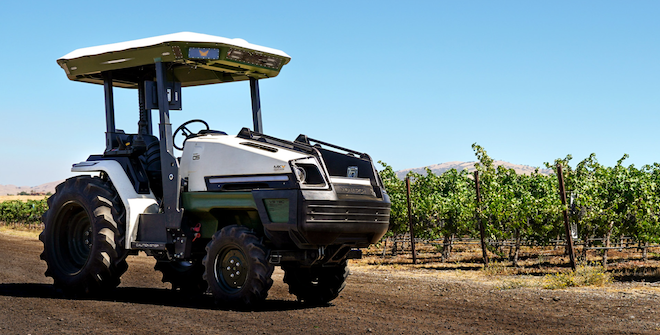

Mar 17, 2022Electric vehicles make debut in agriculture
Innovation and out-of-the-box thinking seek to outfit farmers and especially specialty crop growers interested in automation and alternative energy solutions.


The tractor is built with OEM parts that are accessible, and the battery can easily be swapped out. Monarch sells a cart for moving a spare battery. A charge is good for an average of 10 hours run time and provides about 80 amps of peak energy for 4-5 hours. Speed is governed below 25 mph.
The tractor features an autonomous drive mode as well as a “row following” mode and a “copycat” mode that reproduces a section of recorded driving, said Carlo Mondavi (picured at top), chief farming officer and co-founder at Monarch Tractor.
“I think 100% of tractors under 125 hp will be EVs (electric vehicles) by 2030, which is eight years from now,” he said. Mondavi is a grower of winegrapes and a winemaker, whose great-grandfather Cesaré Mondavi moved the family from Italy to New York to California to farm.
Monarch Tractor has had its share of industry recognition, including being honored by the CES Innovation Awards in the Robotics category for its flagship MK-V tractor. The tractor was on the road in January at the 2022 Unified Wine and Grape Symposium in Sacramento.


Playing the field
Monarch isn’t the only EV for specialty crop growers receiving attention in the industry. An all-electric tractor and an all-electric refrigerated cargo truck were among the top 10 new products recognized by the World Ag Expo in advance of its annual event in Tulare, California.
The Solectrac e70N battery-powered electric tractor is the equivalent to a 70 HP diesel tractor, without the emissions but with all of the power needed on farms and in vineyards, and is a specially designed narrow tractor to fit between narrow rows of vines, according to a news release from the company. The tractor has a four-wheel drive, and its electric motor provides instant torque with only one moving part vs. the roughly 300 in a diesel engine, reducing maintenance needs. The e70N offers 4-8 hours of operation from a single charge, depending on load, and the ability to extend that time with exchangeable battery packs.
“We are committed to providing an opportunity for farmers around the world to power their tractors by using the sun, wind and other clean renewable sources of energy,” Solectrac CEO Mani Iye said in a news release. Solectrac tractors are assembled in Santa Rosa, California, and the company is B Corp certified. Solectrac is a subsidiary of Ideanomics.
Also recognized in the World Ag Expo’s top 10 was an all-electric Class 8 refrigerated truck from Hummingbird EV. The Class 8 trucks “handle the movement of ag goods from farm to warehouse, warehouse to packing centers, packing centers to cold storage, cold storage to retail warehouses, and from retail warehouses to consumers – with zero emissions,” according to the World Ag Expo website.
Other advanced, innovative tractors made the rounds at trade shows during the winter season. Ag giant John Deere – which in December announced acquiring majority ownership in Austrian battery technology provider Kreisel Electric Inc. – displayed at shows a fully autonomous, albeit traditionally powered, tractor that’s commercially available in 2022. New Holland Agriculture North America in February launched a tractor that runs on methane, which can be created from agricultural waste.


EV acceptance
Specialty crop growers value advances in automation in light of their challenges to find labor for tending and harvesting crops. Mondavi said most growers also see a value to electric vehicles out of a desire for cleaner farming, “Not one farmer wants to spray (pesticides).”
With solar panels and a microgrid, “you’re powering your tractor with the same energy that grows crops,” he said.
But even Mondavi thinks that government policy is an important part of EVs being accepted in agriculture.
“I would say that governments need to really embrace (EV vehicles in agriculture),” he said. “A farming tractor is a legacy investment, so a family might buy a tractor and say, ‘This is something my kids are going to have.’ And so, getting people to say, ‘OK, I’m going to get away from my legacy investment into the future of clean farming and whatnot,’ is probably the biggest challenge.
“And I think that having governments to help them get the support that they need – because, on a unit-by-unit basis, if you look at subsidies for electric vehicles, if you look at being able to take a diesel tractor off the road and put in a Monarch electric tractor, it’s like 14 cars when hooked up to the grid. It’s a significant amount of impact. Having governments – local or federal – be able to support the movement with some sort of subsidies so farmers are able to adopt these transitions, I think, is really important. And I say that as a farmer.”
A Monarch tractor at an organic blueberry farm in Oregon, Hopville Farms, was funded through the USDA’s Conservation Innovation Grant program. The tractor will be used to automate specific blueberry field maintenance tasks in an effort to reduce the use of diesel fuels while improving farming productivity, according to Monarch. In cooperation with Oregon State University, Hopville Farms and Monarch Tractor will work together to create a platform for field data collection that is expected to improve agronomy practices.
Farmers need a bit of help, making those transitions Mondavi said.
“We’re a conservative group, right?” he said. “I know that. We don’t just pivot, and make a quick move, reactionarily. And so, that’s one thing I think will be challenging.”
He also makes his sales pitch based on simple savings. A calculator on Monarch’s website allows growers to figure out their potential savings by going electric, based on fuel costs and how much they use their tractors.
“There’s significant savings to be earned by jumping into Monarch,” Mondavi said.
– Stephen Kloosterman, associate editor














